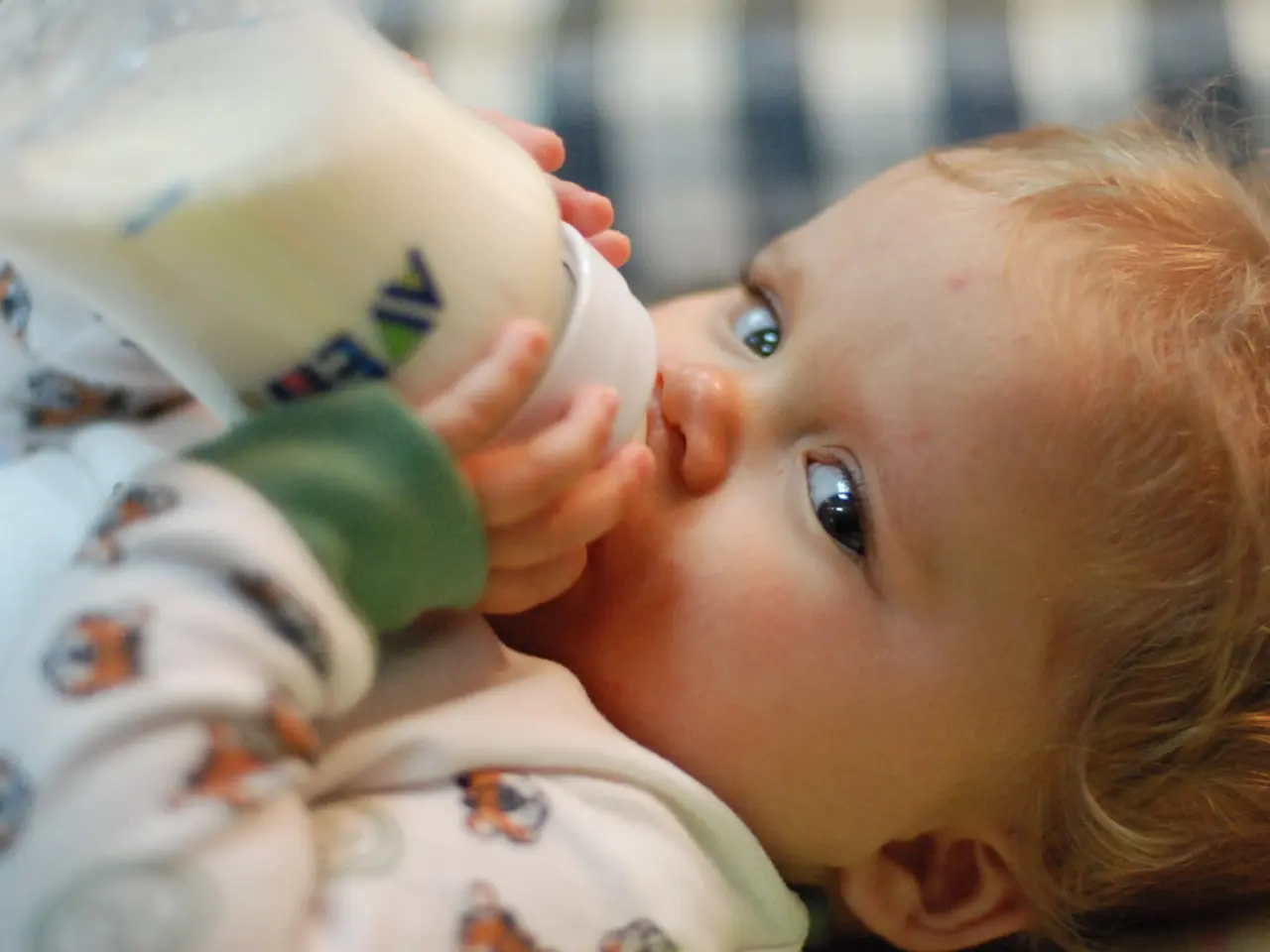Babies' water consumption age: timing and rationales explained
Babies should be introduced to water around 6 months of age, coinciding with the start of solid foods and when they develop better head control and the ability to sit up with support. Until then, breastmilk or infant formula provides all the hydration a baby needs [1][2][4].
At around 6 months, it's important to start offering small sips of water (1–2 ounces per day) to complement milk and solid foods, not to replace them [1][2][4]. This approach supports hydration habits and oral motor skills, often using an open or straw cup to encourage independent drinking. Milk feedings remain the primary source of nutrition and hydration until the baby is 1 year old [1][2][5].
The United Kingdom's National Health Service (NHS) recommends giving whole milk to children until they are at least 2 years old [3]. However, after 12 months, babies can drink whole cow's milk or fortified soy drinks [1][5].
In hot weather, a caregiver should offer more regular breast milk or formula feeds rather than water unless a doctor recommends it [6]. Caregivers should monitor a baby over 6 months for symptoms of dehydration, such as dry mouth and tongue, crying without tears, fewer wet diapers than usual, unusual sleepiness or drowsiness, irritability, and sunken eyes [7].
Caregivers can check with their public health department or pediatrician if they have questions about giving tap water to a baby [8]. The Centers for Disease Control and Prevention (CDC) recommends that babies of 6 to 12 months drink only breast milk or formula and water [1].
Despite containing nutrients, fruit juices and smoothies can cause dental decay in children. Children as young as 5 can have about 150 milliliters of undiluted fruit juice or smoothie daily [9]. The CDC and NHS recommend avoiding unpasteurized drinks, sugar-sweetened drinks, caffeinated drinks, rice milk, fruit juice and smoothies, and drinks containing naturally occurring sugars and acids that can cause dental decay [9].
After 12 months, other drinks caregivers can give children include pasteurized goat's and sheep's milk, unsweetened and fortified milk alternatives such as almond milk, and other milk alternatives as long as they are unsweetened and fortified with calcium [10]. Caregivers should only put water or milk in a cup, avoiding additives like sugar, cereals, rice, or chocolate powder [11].
References:
- Centers for Disease Control and Prevention. (2017). CDC's Infant Nutrition Education and Support Initiative (INESI): A Guide for Healthcare Providers. Retrieved from https://www.cdc.gov/breastfeeding/pdf/inesi_guide.pdf
- NHS. (2020). Feeding your baby: First foods. Retrieved from https://www.nhs.uk/start4life/baby/first-foods/first-foods-what-to-try-and-how-to-try-them/
- NHS. (2021). Cow's milk. Retrieved from https://www.nhs.uk/start4life/baby/milk-feeding/cow-s-milk/
- American Academy of Pediatrics. (2017). Bright Futures: Guidelines for Health Supervision of Infants, Children, and Adolescents. Retrieved from https://www.aap.org/en-us/Documents/bright_futures_in_action.pdf
- NHS. (2020). Milk. Retrieved from https://www.nhs.uk/start4life/baby/milk-feeding/milk/
- NHS. (2020). Hot weather and babies. Retrieved from https://www.nhs.uk/start4life/baby/feeding/hot-weather-and-babies/
- NHS. (2020). Dehydration in babies and young children. Retrieved from https://www.nhs.uk/start4life/baby/feeding/dehydration/
- American Academy of Pediatrics. (2017). Caring for Your Baby: Birth to Age 5. Retrieved from https://www.healthychildren.org/English/ages-stages/baby/pages/caring-for-your-baby.aspx
- Centers for Disease Control and Prevention. (2020). Fruit Juice and Young Children. Retrieved from https://www.cdc.gov/nutrition/infantandtoddlernutrition/fruitjuice.html
- NHS. (2020). Milk alternatives for babies and young children. Retrieved from https://www.nhs.uk/start4life/baby/milk-feeding/milk-alternatives/
- Centers for Disease Control and Prevention. (2020). Healthy Drinks for Babies and Toddlers. Retrieved from https://www.cdc.gov/nutrition/infantandtoddlernutrition/drinks.html
- The type of milk recommended for children up to 2 years old is whole milk, as suggested by the United Kingdom's National Health Service (NHS) [3].
- Around 6 months, introduction of small amounts of water is advisable to complement milk and solid foods, not to replace them [1][2][4].
- Avoid giving tap water to a baby without consulting the public health department or pediatrician [8].
- The CDC recommends that babies between 6 and 12 months consume only breast milk, formula, and water [1].
- Fruit juices and smoothies can lead to dental decay in children, even those as young as 5 [9].
- Dermatitis symptoms in babies include red, scaly patches on the skin, and it may be caused by food allergies [12].
- A caregiver should monitor a baby over 6 months for signs of dehydration such as dry mouth, fewer wet diapers, and irritability [7].
- After 12 months, babies can drink whole cow's milk or fortified soy drinks [1][5].
- Diabetes is a chronic disease that affects the way the body processes blood sugar, and it can be managed through a combination of therapies and treatments [13].
- The World Health Organization recognizes breastfeeding as a critical aspect of health-and-wellness for both babies and their parents, helping to reduce the risk of various diseases, including multiple sclerosis [14].
- Crohn's disease is a type of inflammatory bowel disease that affects the digestive system, and nutrition plays a crucial role in managing the condition [15].
- Atopic dermatitis, also known as eczema, is a skin condition that often appears in infancy and can be exacerbated by certain food allergies [12].
- Science has shown that fitness-and-exercise, as part of a healthy lifestyle, can help prevent numerous diseases, including cancer [16].
- Workplace-wellness programs that focus on health-and-wellness initiatives can improve employee productivity and overall health [17].
- In cases of HIV-positive mothers, breastfeeding should be avoided due to the risk of transmitting the virus to the baby, but it's essential to follow the guidelines provided by medical professionals for infant feeding prep [18].
(Additional words from the list: HIV, breastfeeding, science, cancer, multiple, breast, diabetes, baby, prep, psoriasis, sleep, workplace-wellness, health-and-wellness, fitness-and-exercise, skin-care, therapies-and-treatments, nutrition, parenting)




